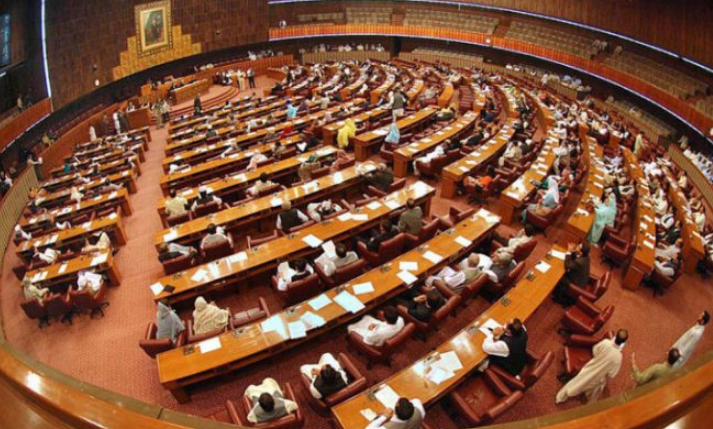Islamabad (Web Desk): The National Assembly (NA) on Friday passed the “Peaceful Assembly and Public Order Bill, 2024” with a majority vote.
Speaker National Assembly Ayaz Sadiq chaired the session with introduction of the Election Act Amendment Bill 2024 by Parliamentary Affairs Minister Azam Nazir Tarar.
The Senate had already approved the bill earlier.
Barrister Daniyal Chaudhry of the Pakistan Muslim League-Nawaz (PML-N) introduced the Peaceful Assembly and Public Order Bill 2024 as a supplementary agenda item.
Law Minister Azam Tarar said that the purpose of the bill is to maintain peace during public assemblies and processions.
He dismissed the opposition’s concerns, noting that the increasing number of demonstrations in the federal capital has caused significant inconvenience to citizens. The bill seeks to address these challenges while preserving the right to peaceful assembly.
The law minister said the Peaceful Assembly and Public Order Bill 2024 aims to ensure that the public order is not disturbed by public gatherings.
He rejected the notion of the opposition and said the federal capital was seemingly “under siege” and the growing number of processions had made the lives of citizens miserable.
The bill had been passed by the Senate on Thursday. With approval from both houses, the bills will now be sent to the president for final endorsement to become law.
Under the new law, the Deputy Commissioner (DC) of Islamabad will grant permission for rallies. In case of rejection, an appeal can be made to the Chief Commissioner. If unsatisfied, the decision can be further challenged before the Interior Secretary.
The government will designate specific areas for gatherings, which will be officially notified.
For any public gathering in Islamabad, organizers must submit an application to the DC at least seven days in advance.
The application must include details of the location, number of participants, and the purpose of the gathering. The DC will have the authority to reject the request, providing written reasons for doing so.
Prior to granting permission, the DC will review the security situation and obtain clearance from law enforcement agencies. Gatherings will only be allowed in designated areas.
The DC can amend or revoke permissions based on national security risks, potential violence, or public safety concerns. The government may also declare certain areas as "Red Zones" or "High-Security Zones."
If a gathering poses a threat to public safety or national security, the DC has the authority to ban it. Reasons for the ban must be provided in writing, and the affected party can appeal the decision within 15 days.
Meanwhile, the DC can instruct the police to disperse a gathering if it disrupts public order. In cases of non-compliance, the police may use force to disband the assembly.
As per the new law, participants in unauthorised gatherings may face arrest and detention. Those found guilty could face up to three years in prison and fines while repeat offenders could be sentenced to up to 10 years.


